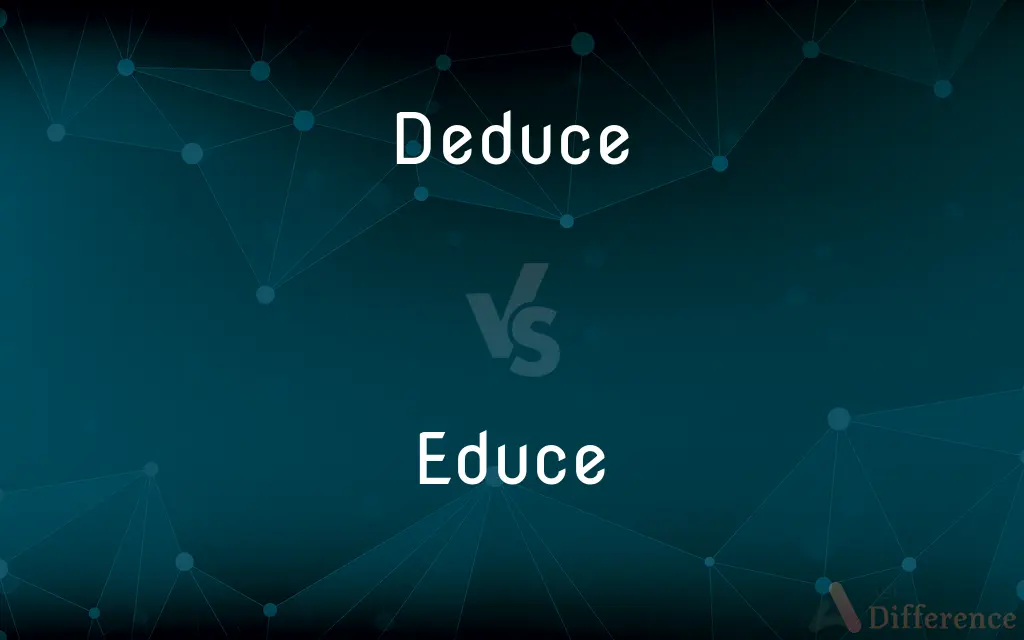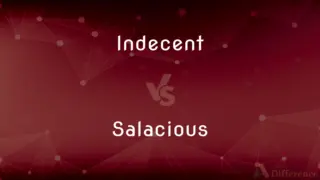Deduce vs. Educe — What's the Difference?
By Tayyaba Rehman — Updated on October 4, 2023
Deduce means to infer information from known facts; educe means to bring out or develop something latent or potential. They differ in that deduce is about drawing specific conclusions, while educe is about bringing out underlying information.

Difference Between Deduce and Educe
Table of Contents
ADVERTISEMENT
Key Differences
Deduce is a term that primarily refers to drawing a specific conclusion from general principles or premises, often using logical reasoning. Educe, on the other hand, refers to bringing out, developing, or revealing something latent or potential, typically information or qualities.
Deduce implies a process of inference where one concludes specific information based on general knowledge or premises. Educe, conversely, involves extracting or deriving information or qualities that are not immediately apparent, often bringing latent details to the foreground.
When one deduces, they make logical inferences or interpretations, often aiming to arrive at a coherent conclusion based on given or observed facts. Educe, alternatively, can signify eliciting responses, qualities, or information, drawing out something that is inherent but not obvious.
In essence, to deduce is to infer or conclude, typically using logical reasoning, involving a cognitive process of linking premises to arrive at conclusions. To educe is to bring forth, reveal, or develop, emphasizing the drawing out of inherent qualities or information.
The action of deducing often involves analyzing and synthesizing available information to reach logical conclusions. In contrast, the act of educing emphasizes the manifestation or development of inherent but latent or unexpressed qualities or information.
ADVERTISEMENT
Comparison Chart
Definition
Inferring specifics from general facts.
Bringing out latent information.
Purpose
To arrive at a logical conclusion.
To reveal or develop inherent qualities or information.
Process
Logical reasoning and inference.
Drawing out or developing.
Usage
Used in logical and analytical contexts.
Used in educational and psychological contexts.
Outcome
Specific conclusion or inference.
Revelation or development of potential information or qualities.
Compare with Definitions
Deduce
To reach a conclusion based on available information.
From the available evidence, we can deduce the sequence of events leading to the accident.
Educe
To extract or derive information or qualities.
The therapist tried to educe responses from the silent child.
Deduce
To conclude from evidence or premises.
From the clues, the detective could deduce the identity of the culprit.
Educe
To bring out or develop something latent or potential.
The teacher’s role is to educe the potential of every student.
Deduce
To reason out or conclude by thoughtful consideration of facts or principles.
After reviewing the documents, she could deduce that the contract was flawed.
Educe
To elicit or evoke latent qualities or information.
The counselor was able to educe the feelings of the client during the session.
Deduce
To derive as a conclusion from facts or premises.
We can deduce the truth from the given statements.
Educe
To draw forth or bring out information or qualities that are not immediately apparent.
Through careful questioning, the investigator was able to educe crucial information.
Deduce
To reach (a conclusion) by reasoning.
Educe
Bring out or develop (something latent or potential)
Out of love obedience is to be educed
Deduce
To infer from a general principle; reason deductively
Deduced from the laws of physics that the new airplane would fly.
Educe
To draw or bring out; elicit.
Deduce
To trace the origin or derivation of.
Educe
To infer or work out from given facts
Educe principles from experience.
Deduce
(transitive) To reach (a conclusion) by applying rules of logic or other forms of reasoning to given premises or known facts.
Educe
To direct the course of (a flow, journey etc.); to lead in a particular direction.
Deduce
(transitive) To examine, explain, or record (something) in an orderly manner.
Educe
(transitive) To infer or deduce (a result, theory etc.) from existing data or premises.
Deduce
To obtain (something) from some source; to derive.
Educe
(transitive) To draw out or bring forth from some basic or potential state; to elicit, to develop.
Deduce
To be derived or obtained from some source.
Educe
To isolate (a substance) from a compound; to extract.
Deduce
To take away (something); to deduct, to subtract (something).
To deduce a part from the whole
Educe
(transitive) To cause or generate; to bring about.
Deduce
To lead (something) forth.
Educe
An inference.
Deduce
To lead forth.
He should hither deduce a colony.
Educe
To bring or draw out; to cause to appear; to produce against counter agency or influence; to extract; to evolve; as, to educe a form from matter.
The eternal art educing good from ill.
They want to educe and cultivate what is best and noblest in themselves.
Deduce
To take away; to deduct; to subtract; as, to deduce a part from the whole.
Educe
Deduce (a principle) or construe (a meaning);
We drew out some interesting linguistic data from the native informant
Deduce
To derive or draw; to derive by logical process; to obtain or arrive at as the result of reasoning; to gather, as a truth or opinion, from what precedes or from premises; to infer; - with from or out of.
O goddess, say, shall I deduce my rhymesFrom the dire nation in its early times?
Reasoning is nothing but the faculty of deducing unknown truths from principles already known.
See what regard will be paid to the pedigree which deduces your descent from kings and conquerors.
Educe
Develop or evolve, especially from a latent or potential state
Deduce
Reason by deduction; establish by deduction
Educe
To manifest or bring to light inherent qualities or information.
The workshop aimed to educe the creative abilities of the participants.
Deduce
Conclude by reasoning; in logic
Deduce
To infer by logical reasoning.
One can deduce the outcome of the experiment from the given data.
Common Curiosities
What does deduce mean?
Deduce means to infer specific information from general facts or premises through logical reasoning.
What does educe mean?
Educe means to bring out, develop, or reveal latent or potential information or qualities.
Is educe related to educational processes?
Yes, educe is often used in educational and psychological contexts to bring out inherent potential or information.
Does to deduce require logical reasoning?
Yes, deducing typically involves the application of logical reasoning to infer conclusions from premises.
How is deducing different from educing?
Deducing involves making logical inferences to reach conclusions, while educing involves bringing out or developing latent information or qualities.
Is educing related to manifesting potential?
Yes, educing relates to manifesting or bringing to light inherent potential or latent qualities or information.
Does deducing involve analytical skills?
Yes, deducing often requires analytical skills to logically infer specific conclusions from general facts or premises.
Can one deduce conclusions from evidence?
Yes, one can deduce conclusions by logically interpreting available evidence or premises.
Is deduce used in logical contexts?
Yes, deduce is often used in logical and analytical contexts to infer conclusions from given information.
Can educe refer to revealing inherent qualities?
Yes, to educe can mean revealing or developing inherent but unexpressed qualities or information.
Is a deduction always accurate?
A deduction is based on logical inference from available information; its accuracy depends on the validity of the premises and the soundness of the reasoning.
Can educing involve bringing out creative abilities?
Yes, educing can involve activities or processes aimed at bringing out or developing creative abilities in individuals.
Can educe mean to extract information?
Yes, to educe can mean to extract or derive latent or not immediately apparent information.
Can one educe emotions or reactions from someone?
Yes, one can educe emotions or reactions by creating conditions that allow underlying feelings or responses to be revealed.
Is deduction the noun form of deduce?
Yes, "deduction" is the noun form of "deduce" and refers to the act or process of deducing.
Share Your Discovery

Previous Comparison
Mimick vs. Mimic
Next Comparison
Indecent vs. SalaciousAuthor Spotlight
Written by
Tayyaba RehmanTayyaba Rehman is a distinguished writer, currently serving as a primary contributor to askdifference.com. As a researcher in semantics and etymology, Tayyaba's passion for the complexity of languages and their distinctions has found a perfect home on the platform. Tayyaba delves into the intricacies of language, distinguishing between commonly confused words and phrases, thereby providing clarity for readers worldwide.













































